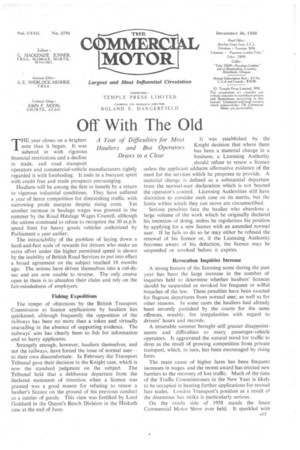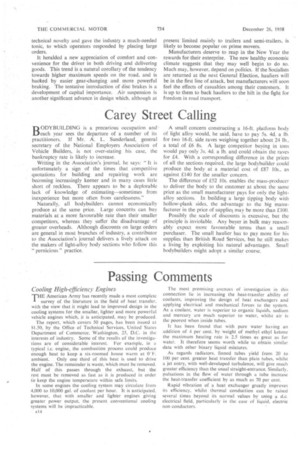Off With The Old
Page 15

Page 16

If you've noticed an error in this article please click here to report it so we can fix it.
THE year closes on a brighter note than it began. It was ushered in with rigorous financial restrictions and a decline in trade, and road transport operators and commercial-vehicle manufacturers rightly regarded it with foreboding. It ends in a buoyant spirit with credit free and trade prospects encouraging.
Hauliers will be among the first to benefit by a return to vigorous industrial conditions. They have suffered a year of fierce competition for diminishing traffic, with narrowing profit margins despite rising costs. Yet another increase in haulage wages Was granted in the summer by the Road Haulage Wages Council, although the unions continued to refuse to recognize the 30 m.p.h. speed limit for heavy goods vehicles authorized by Parliament a year earlier.
The intractability of the problem of laying down a hard-and-fast scale of rewards for drivers who make an extra effort under the higher permitted ,speed is shown by the inability of British Road Services to put into effect a broad agreement on the subject reached 18 months ago. The unions have driven themselves into a cul-desac and are now unable to reverse. The only course open to them is to abandon their Claim and rely on the fair-mindedness of employers.
Fishing Expeditions The tempo of objections by the British Transport Commission to licence applications by hauliers has quickened, although frequently the opposition of the railways has been no more than a token and virtually unavailing in the absence of supporting evidence. The railways' aim has clearly been to fish for information and to harry applicants.
. Strangely enough, however, hauliers themselves, and not the railways, have forced the issue of normal user-tO their own discomforture: In February the Transport Tribunal gave their decision in the Knight case, which is now the standard judgment on the subject. The Tribunal held that a deliberate departure from the declared statement of intention when a licence was granted was a good reason for refusing to renew a haulier's licence on the ground of his previous conduct ,as a carrier of goods. This view was fortified by Lord • Goddard in the Queen's Bench Division in the Hesketh case at the end of June. It was established by the Knight decision that where there has been a material change in a business, a Licensing Authority should refuse to renew a licence unless the applicant adduces affirmative evidence of the need for the services which he proposes to provide. A material change is defined as a substantial departure from the normal-user declaration which is not beyond the operator's control. Licensing Authorities still have discretion to consider each case on its merits, but the limits within which they can move are circumscribed.
Serious penalties face the haulier who abandons a large volume of the work which he originally declared his intention of doing, unless he regularizes his position by applying for a new licence with an amended normal user. If he fails to do so he may either be refused the renewal of his licence or, if the Licensing Authority becomes aware of his defection, the licence may be suspended or revoked before it expires.
Revocation Inquiries Increase A strong feature of the licensing scene during the past year has been the large increase in the number of inquiries held to determine whether hauliers' licences should be suspended or revoked for frequent or wilful breaches of the law. These penalties have been exacted for flagrant departures from normal user, as well as for other reasons. In some cases the hauliers had already been severely punished by the courts for the same offences, notably, for irregularities with regard to drivers' hours and records.
A miserable summer brought still greater disappointments and difficulties to many passenger-vehicle operators. It aggravated the natural trend for traffic to drop as the result of growing competition from private transport, which, in turn, has been encouraged by rising fares.
The main cause of higher fares has been frequent increases in wages, and the recent award has erected new barriers to the recovery of lost traffic. Much of the time of the Traffic Commissioners in the New Year is likely to be occupied in hearing further applications for revised fare scales. London Transport's position as a result of the disastrous bus strike is particularly serious.
On the credit side of _ 1958 stands the finest Commercial Motor Show ever held. It sparkled with technical novelty and gave the industry a much-needed tonic, to which operators responded by placing large orders.
It heralded a new appreciation of comfort and convenience for the driver in both driving and delivering goods. This trend is a natural corollary of the tendency towards higher maximum speeds on the road, and is backed by easier gear-changing and more powerful braking. The tentative introduction of disc brakes is a development of capital importance. Air suspension is another significant advance in design which, although at present limited mainly to trailers and semi-trailers, is likely, to become popular on prime movers.
Manufacturers deserve to reap in the New Year the rewards for their enterprise. The new healthy economic climate suggests that they may well begin to do so. Much may, however, depend on politics. If the Socialists are returned at the next General Election, hauliers will be in the first line of attack, but manufacturers will soon feel the effects of casualties among their customers. It is up to them to back hauliers to the hilt in the fight for freedom in road transport.








































































